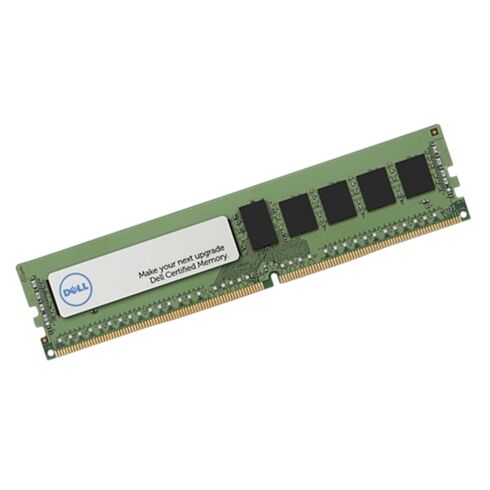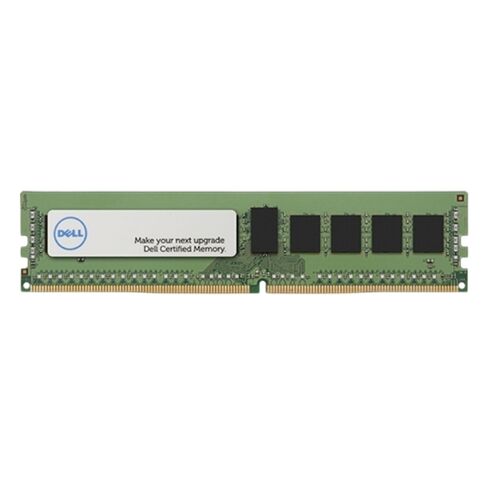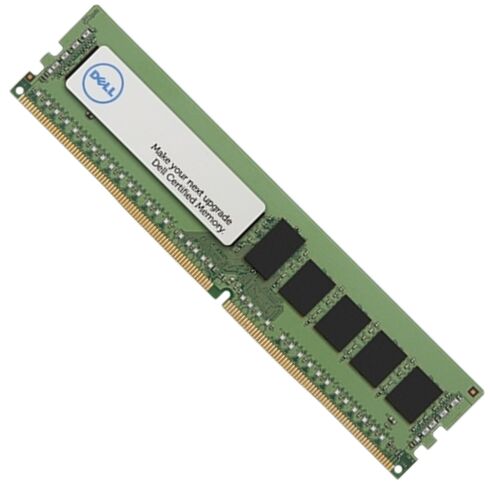370-ABUG Dell 16GB 2133MHZ PC4-17000 DDR4 ECC RDIMM Memory Module
- — Free Ground Shipping
- — Min. 6-month Replacement Warranty
- — Genuine/Authentic Products
- — Easy Return and Exchange
- — Different Payment Methods
- — Best Price
- — We Guarantee Price Matching
- — Tax-Exempt Facilities
- — 24/7 Live Chat, Phone Support
- — Visa, MasterCard, Discover, and Amex
- — JCB, Diners Club, UnionPay
- — PayPal, ACH/Bank Transfer (11% Off)
- — Apple Pay, Amazon Pay, Google Pay
- — Buy Now, Pay Later - Affirm, Afterpay
- — GOV/EDU/Institutions PO's Accepted
- — Invoices
- — Deliver Anywhere
- — Express Delivery in the USA and Worldwide
- — Ship to -APO -FPO
- — For USA - Free Ground Shipping
- — Worldwide - from $30
Same product also available in:
| SKU/MPN | Warranty | Price | Condition | You save |
|---|---|---|---|---|
| 370-ABUG | 1 Year Warranty | $245.00 | New Sealed in Box (NIB) | You save: $85.75 (26%) |
| 370-ABUG | 1 Year Warranty | $145.00 | New (System) Pull | You save: $50.75 (26%) |
Product Overview
Manufacturer Details
- Brand: DELL
- Part Number: 370-ABUG
- Product Type: 16GB DDR4 SDRAM Memory Module
Key Specifications
Memory Characteristics
- Total Capacity: 16GB
- Memory Technology: DDR4 SDRAM
- Module Count: 1 x 16GB
- Chip Configuration: x4
Performance Metrics
- Bus Speed: 2133MHz (DDR4-2133/PC4-17000)
- Data Integrity: ECC (Error-Correcting Code)
- Signal Type: Registered
- CAS Latency: CL15
Additional Features
- Memory Configuration: Dual Rank
- Voltage: Ultra Low Voltage (1.2V)
- Upgrade Type: System Specific
Physical Specifications
- Form Factor: 288-pin RDIMM
- Shipping Dimensions: Height - 1.00", Depth - 6.75"
- Weight: 0.20 lb
Compatibility
Compatible Models
- DELL PowerEdge C4130
- DELL PowerEdge M630
- DELL PowerEdge R430
- DELL PowerEdge R530
- DELL PowerEdge R610
- DELL PowerEdge R630
- DELL PowerEdge R730
- DELL PowerEdge R730xd
- DELL PowerEdge R920
- DELL PowerEdge T430
- DELL PowerEdge T630
- Precision Workstation R7910 XL
- Precision Workstation T5810 XL
- Precision Workstation T7810 XL
- Precision Workstation T7910 XL
- Precision Workstations R7910
- Precision Workstations T5810
- Precision Workstations T7810
- Precision Workstations T7910
Capacity: 16GB
The capacity of a memory module is an essential feature that determines the amount of data it can store and process. In the case of the Dell 370-ABUG Memory Module, it offers an impressive capacity of 16GB, which is ideal for users who require high-performance computing and multitasking capabilities.
Benefits of a 16GB Capacity
1. Enhanced Performance: With a larger capacity, the Dell 370-ABUG Memory Module allows for smoother and more efficient multitasking. It can handle demanding applications, such as video editing software or resource-intensive games, without experiencing significant performance bottlenecks.
2. Improved System Responsiveness: The increased capacity enables quicker data retrieval and processing, resulting in improved system responsiveness. Users can experience faster application launches, reduced loading times, and seamless navigation through complex tasks.
3. Future-Proofing: Investing in a memory module with a higher capacity like the Dell 370-ABUG ensures compatibility with future software updates and system requirements. As technology advances and applications demand more memory, having a 16GB capacity will prevent the need for immediate upgrades.
Importance of 16GB Capacity for Professionals
Professionals in various fields can greatly benefit from a memory module with a 16GB capacity:
1. Content Creators:
Graphic designers, video editors, and photographers often work with large files that require significant memory resources. A 16GB capacity allows them to seamlessly manipulate high-resolution images, edit videos in real-time, and handle complex design projects without encountering performance limitations.
2. Gamers:
Gaming enthusiasts can enjoy immersive gaming experiences with a 16GB memory module. It enables them to run the latest games at higher graphics settings, reducing lag and ensuring smooth gameplay. Additionally, it allows for faster loading times, minimizing interruptions during gameplay.
3. Programmers and Developers:
Programmers and developers dealing with resource-intensive applications, virtual machines, or large codebases can greatly benefit from a 16GB capacity. It provides ample memory for smooth compilation, debugging, and testing processes, resulting in increased productivity.
Speed: 2133MHz
The speed of a memory module refers to the rate at which it can transfer data. The Dell 370-ABUG Memory Module boasts a speed of 2133MHz, ensuring fast and efficient data processing for a variety of computing needs.
Benefits of 2133MHz Speed
1. Faster Data Transfer: The higher speed of the Dell 370-ABUG Memory Module allows for quick and seamless transfer of data between the memory module and other system components. This results in reduced latency and improved overall system performance.
2. Smoother Multitasking: The increased speed enables the memory module to handle multiple tasks simultaneously without experiencing significant slowdowns. Users can switch between applications seamlessly, leading to improved productivity and efficiency.
3. Enhanced Gaming Performance: Gamers can benefit from the higher speed of the Dell 370-ABUG Memory Module as it facilitates faster loading times and smoother gameplay. It ensures that game assets are loaded quickly, reducing lag and providing a more immersive gaming experience.
Importance of 2133MHz Speed for Different Users
The 2133MHz speed of the Dell 370-ABUG Memory Module is advantageous for various user groups:
1. Professional Video Editors:
Video editing professionals often work with high-resolution footage that requires real-time rendering and previewing. The 2133MHz speed ensures smooth playback and reduces the time required for rendering, enhancing the editing workflow.
2. Gamers and Enthusiasts:
For gamers and enthusiasts, a higher speed memory module like the Dell 370-ABUG provides a competitive edge. It allows for faster loading of game environments, quicker response times, and seamless transitions between game levels or scenes.
3. Data Analysts and Researchers:
Data analysis and research tasks often involve processing large datasets. The 2133MHz speed of the memory module enables quicker data manipulation, reducing the time required for complex calculations and increasing productivity.
Technology: DDR4 SDRAM
The technology used in a memory module plays a crucial role in its performance and compatibility with other system components. The Dell 370-ABUG Memory Module utilizes DDR4 SDRAM (Double Data Rate 4 Synchronous Dynamic Random Access Memory), which offers significant advantages over its predecessors.
Benefits of DDR4 SDRAM Technology
1. Increased Bandwidth: DDR4 SDRAM provides higher bandwidth compared to older memory technologies. This allows for faster data transfer rates, resulting in improved overall system performance.
2. Energy Efficiency: The Dell 370-ABUG Memory Module's DDR4 SDRAM technology consumes less power compared to previous generations. This not only helps reduce energy costs but also contributes to a greener computing environment.
3. Higher Density: DDR4 SDRAM supports higher memory densities, allowing for larger capacity modules like the 16GB Dell 370-ABUG. This is particularly beneficial for users who require extensive memory resources for resource-intensive applications or multitasking.
Importance of DDR4 SDRAM Technology for Different Users
The DDR4 SDRAM technology utilized by the Dell 370-ABUG Memory Module offers advantages to a range of users:
1. Business Professionals:
Business professionals who rely on memory-intensive applications, such as data analytics software or virtual machines, can benefit from the higher bandwidth and increased memory capacity provided by DDR4 SDRAM. It enables them to handle complex tasks efficiently.
2. Content Creators:
Content creators working with graphic design, video editing, or 3D modeling software can take advantage of the higher memory density supported by DDR4 SDRAM. It allows for seamless manipulation of large files, ensuring smooth workflows without performance bottlenecks.
3. System Builders and Enthusiasts:
System builders and technology enthusiasts can benefit from the energy efficiency and improved overall performance offered by DDR4 SDRAM. It ensures their systems are future-proofed with the latest memory technology, providing a reliable and efficient computing experience.
Form Factor: 288-Pin Rdimm
The form factor of a memory module refers to its physical dimensions and layout. The Dell 370-ABUG Memory Module features a 288-Pin Rdimm (Registered Dual In-Line Memory Module) form factor, which offers several benefits in terms of compatibility and performance.
Benefits of 288-Pin Rdimm Form Factor
1. Compatibility: The 288-Pin Rdimm form factor is widely used in servers and high-performance computing systems. Choosing the Dell 370-ABUG Memory Module with this form factor ensures compatibility with a wide range of systems, including Poweredge Servers.
2. Increased Stability: The Registered feature in the 288-Pin Rdimm form factor enhances the stability of the memory module. It reduces electrical load on the memory controller, minimizing signal integrity issues and potential errors.
3. Higher Capacity Support: The 288-Pin Rdimm form factor supports higher memory capacities compared to other form factors. This allows for larger memory modules, such as the 16GB Dell 370-ABUG, giving users greater flexibility in meeting their memory requirements.
Importance of 288-Pin Rdimm Form Factor for Different Users
The 288-Pin Rdimm form factor of the Dell 370-ABUG Memory Module caters to specific user groups:
1. Server Administrators:
Server administrators and IT professionals can benefit from the compatibility and stability provided by the 288-Pin Rdimm form factor. It ensures seamless integration with Poweredge Servers and other server platforms, enhancing overall system reliability.
2. Workstation Users:
Users who require high-performance workstations for tasks such as 3D rendering, simulations, or video editing can take advantage of the larger memory capacities supported by the 288-Pin Rdimm form factor. It allows for extensive multitasking and smooth operation of resource-intensive applications.
3. Data Centers:
Data centers dealing with large-scale computing operations benefit from the increased capacity and stability provided by the 288-Pin Rdimm form factor. It allows for efficient data processing and storage, ensuring reliable performance in demanding environments.
ECC: ECC Registered
Error Correcting Code (ECC) is a feature found in certain memory modules that helps detect and correct single-bit errors, ensuring data integrity and system stability. The Dell 370-ABUG Memory Module utilizes ECC Registered technology, providing an additional layer of reliability and protection against memory errors.
Benefits of ECC Registered Technology
1. Data Integrity: ECC Registered technology helps identify and correct single-bit errors that may occur during data transmission or storage. This ensures the accuracy and integrity of critical data, reducing the risk of system crashes or data corruption.
2. System Stability: By detecting and correcting errors, ECC Registered technology improves overall system stability. It prevents issues caused by memory errors, such as application crashes or system freezes, providing a more reliable computing experience.
3. Enhanced Server Performance: ECC Registered memory modules like the Dell 370-ABUG are especially beneficial in server environments where data integrity is crucial. They help maintain the stability and reliability of server systems, reducing downtime and ensuring uninterrupted operations.
Importance of ECC Registered Technology for Different Users
ECC Registered technology offers advantages to various user groups:
1. Enterprise Users:
Enterprise users dealing with mission-critical applications, databases, or financial transactions can benefit from the data integrity provided by ECC Registered memory modules. It ensures accurate processing and storage of sensitive data, reducing the risk of errors or data loss.
2. Scientific Researchers:
Scientific researchers working with complex simulations or data analysis rely on accurate results for their studies. ECC Registered technology helps maintain the integrity of their calculations, ensuring that their findings are reliable and reproducible.
3. Financial Institutions:
Financial institutions handling large volumes of transactions require reliable systems to ensure accuracy and security. ECC Registered memory modules provide an additional layer of protection against potential errors that could impact financial operations.
Voltage: 1.2V
The voltage requirement of a memory module determines the amount of electrical power it consumes. The Dell 370-ABUG Memory Module operates at a low voltage of 1.2V, offering energy efficiency and reduced heat generation.
Benefits of 1.2V Voltage
1. Energy Efficiency: The low voltage requirement of the Dell 370-ABUG Memory Module helps reduce overall power consumption. This not only contributes to environmental sustainability but also leads to cost savings by minimizing energy bills.
2. Heat Reduction: Lower voltage results in reduced heat generation by the memory module. This contributes to improved system cooling and helps maintain optimal operating temperatures, preventing thermal throttling and potential performance degradation.
3. Compatibility: The 1.2V voltage requirement is compatible with a wide range of systems, including most modern desktops and servers. Choosing the Dell 370-ABUG Memory Module with this voltage ensures seamless integration and reliable performance.
Importance of 1.2V Voltage for Different Users
The 1.2V voltage requirement of the Dell 370-ABUG Memory Module offers advantages to various user groups:
1. Home Users:
Home users seeking energy-efficient computing solutions can benefit from the low voltage requirement of the memory module. It helps reduce electricity consumption and keeps their systems running efficiently without generating excessive heat.
2. Data Centers:
Data centers housing numerous servers can significantly benefit from the energy efficiency and reduced heat generation provided by the 1.2V voltage requirement. It contributes to lower cooling costs and improved overall system reliability.
3. System Builders:
System builders and enthusiasts who prioritize energy efficiency and system stability will appreciate the 1.2V voltage requirement of the Dell 370-ABUG Memory Module. It ensures their systems are optimized for performance while minimizing power consumption.
Cas Latency: CL15
Cas Latency (CL) is a measure of the delay between when a memory module receives a command and when it responds. The Dell 370-ABUG Memory Module features a Cas Latency of CL15, which indicates fast response times and efficient memory operation.
Benefits of CL15 Cas Latency
1. Faster Response Times: The CL15 Cas Latency ensures quick response times from the memory module, resulting in reduced latency and improved overall system performance. This is particularly beneficial in applications that require rapid data access or real-time processing.
2. Enhanced Multitasking: With faster response times, the Dell 370-ABUG Memory Module enables smoother multitasking. Users can switch between applications seamlessly without experiencing significant delays, enhancing productivity and workflow efficiency.
3. Compatibility: The CL15 Cas Latency is compatible with a wide range of systems, including most modern desktops and servers. Choosing the Dell 370-ABUG Memory Module with this Cas Latency ensures reliable operation and seamless integration.
Importance of CL15 Cas Latency for Different Users
The CL15 Cas Latency of the Dell 370-ABUG Memory Module offers advantages to various user groups:
1. Gamers:
Gamers can benefit from the fast response times provided by a CL15 Cas Latency. It ensures minimal delay between their input commands and the system's execution, resulting in more responsive gameplay and better overall gaming experiences.
2. Content Creators:
Content creators who work with resource-intensive applications, such as video editing software or 3D rendering tools, can take advantage of the efficient memory operation offered by the CL15 Cas Latency. It allows for smooth real-time previews and faster rendering times.
3. System Builders and Enthusiasts:
System builders and technology enthusiasts who prioritize system performance can appreciate the fast response times of the Dell 370-ABUG Memory Module. It ensures their systems are optimized for efficient memory operations, resulting in improved overall performance.
Data Width: 2rx4
Data Width refers to the number of bits that can be transferred simultaneously between the memory module and the memory controller. The Dell 370-ABUG Memory Module has a Data Width of 2rx4, which offers enhanced data transfer capabilities and improved system performance.
Benefits of 2rx4 Data Width
1. Increased Bandwidth: The 2rx4 Data Width allows for the simultaneous transfer of multiple data bits, resulting in increased bandwidth. This enables faster data transfer rates between the memory module and other system components, enhancing overall system performance.
2. Improved System Responsiveness: With increased bandwidth, the Dell 370-ABUG Memory Module enables quicker data retrieval and processing. This leads to improved system responsiveness, faster application launches, reduced loading times, and seamless navigation through complex tasks.
3. Compatibility: The 2rx4 Data Width is compatible with a variety of systems, making the Dell 370-ABUG Memory Module a versatile choice. Whether used in desktops or servers, it ensures reliable operation and efficient data transfer capabilities.
Importance of 2rx4 Data Width for Different Users
The 2rx4 Data Width of the Dell 370-ABUG Memory Module caters to various user groups:













